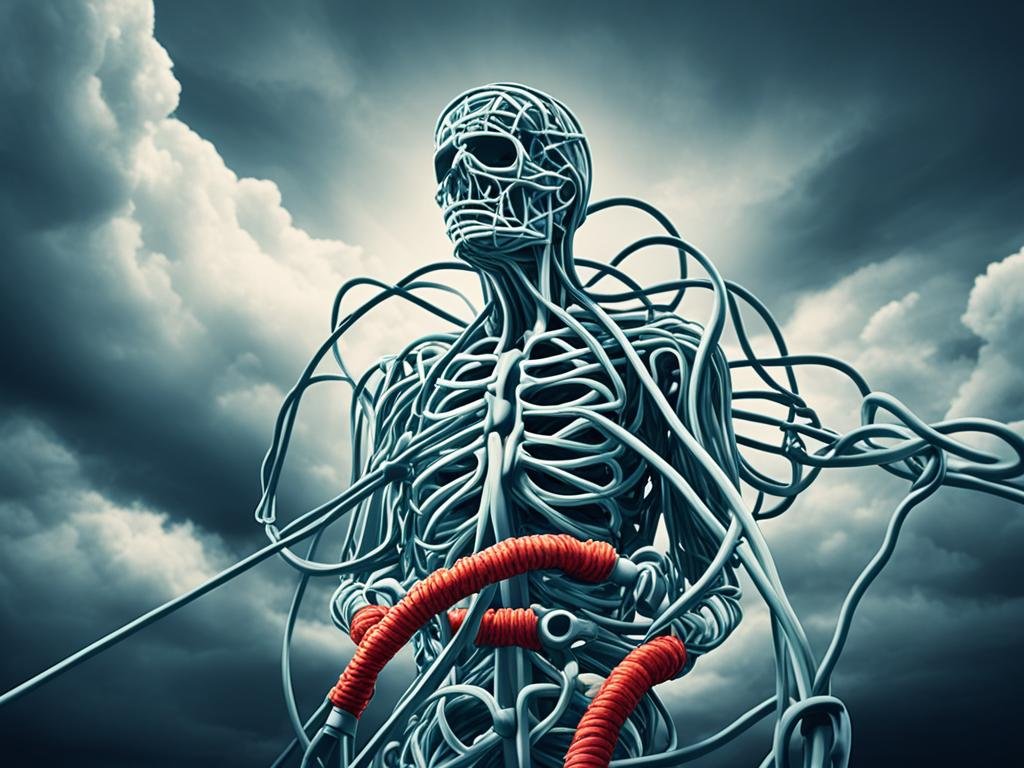Stress is how our body reacts to tough situations. It’s our way of handling both what’s happening outside and inside us. When we face a lot of stress, our body might not work as it should. This can mess with our physical and emotional health. So, even though stress can sometimes push us to do better, too much can cause problems.
Doctors have seen that long-lasting stress can mess with our body’s balance. This can harm how our bladder and other parts of the urinary system work. People with issues like overactive bladder or painful bladder syndrome often feel more stressed. They might also feel sad or worried a lot. War veterans who have mental health issues are more likely to have such bladder problems.
Key Takeaways
- Chronic psychological stress is a potential risk factor for lower urinary tract dysfunction (LUTD), including overactive bladder (OAB) and interstitial cystitis–bladder pain syndrome (IC/BPS).
- Adults and children with LUTDs often display a positive relation to affective disorders like anxiety and depression.
- Veterans with psychiatric comorbidities are more likely to have an LUTD diagnosis, suggesting a link between chronic stress and bladder symptoms.
- Stress can weaken the immune system, impact eating habits, and affect the sympathetic nervous system, all of which can contribute to urinary tract infections (UTIs).
- Managing stress through relaxation techniques, maintaining a healthy diet, and supporting the immune system may help prevent stress-induced UTIs.
Introduction
What is Stress?
Stress is how our body reacts to tough things. These can be from outside or inside us. When we get stressed, our body might not feel balanced. This is because stress affects our minds.
Some stress can help us work harder. But, too much stress can hurt us. It can make our body’s natural balance not work right. This can cause problems with how our body works and feels.
Link Between Stress and Lower Urinary Tract Dysfunction
Stress can also mess with how our bladder works. This can make problems worse for people with OAB and IC/BPS. Scientists have seen a strong connection between chronic stress and these issues (Macaulay et al., 1987; Lutgendorf et al., 2001; Rothrock et al., 2001; McVary et al., 2005; Fan et al., 2008; Zhang et al., 2013; Bradley et al., 2014; Lai et al., 2015a,2016).
Clinical Evidence Linking Stress and UTIs
Many studies show stress is closely connected to UTIs and bladder troubles. Adults and kids with stress often get conditions like overactive bladder. These conditions link to feelings like anxiety and depression.
Prevalence of LUTDs in Adults with Affective Disorders
People with anxiety or depression face hugerisk of bladder problems. Stress can make urinary symptoms worse, creating a hard cycle. This cycle affects both the mind and body.
LUTDs in Children with Psychological Symptoms
Kids also show this connection between minds and bladder problems. If children stress about urination issues, it heavily affects their lives. These findings prove that mental state can deeply impact health.
Veterans with Psychiatric Comorbidities and LUTDs
Research on veterans backs this up too. Those with PTSD or depression often have UTIs. The tough experiences of wars can make these issues more common.
Altogether, these studies point out how stress can cause and worsen bladder troubles. They highlight the need for a full care approach for bladder health.
Animal Models Exploring Stress-Induced UTIs
We know about chronic mental stress causing issues in the lower urinary tract. But the exact reasons are still a mystery. Clinical studies can’t give us all the answers because of certain limits. But, using stress-related animal models lets us explore more. These models show similar signs of Lower Urinary Tract Dysfunctions (LUTDs). This includes things like using the bathroom more often, feeling pain in the bladder, and the bladder swelling.
Advantages of Animal Models
There are lots of animal models being used to study stress-induced LUTD. Some common ones are water avoidance stress (WAS), social stress, stress from early life, and stress that changes all the time. These models help us understand parts of LUTD that also happen in people. They let us test certain ideas. Also, they show that different kinds of mental stress might affect the body in different ways.
Commonly Used Models
Animal studies on stress-related urinary problems have some big pluses. They let scientists control the situation and try certain kinds of stress. This helps us really see how mental stress and UTI issues are linked. Using these animal models gives us a better look at how stress and urinary problems go hand in hand. This is something we can’t learn as well from only studying people clinically.
Can Stress Cause UTI?
Stress weakens the immune and can make us get more infections like UTIs. It impacts what we eat, leading to dehydration and not enough good foods. This makes our bodies more open to getting sick.
Stress and Weakened Immune System
Long-term stress lowers our ability to fight off infections. It messes with our nerves and how they talk to our immune system. This is one way stress makes UTIs more likely.
Stress and Eating Habits
When we’re stressed, we’re more likely to eat and drink things that aren’t good for us. This includes foods that can cause inflammation. Nutrient-poor diets make it easier for us to get sick.
Stress and the Sympathetic Nervous System
Stress can also make our body’s “fight-or-flee” system go into overdrive. It affects our urinary tract, making us more likely to get UTIs. This is why it’s important to try to manage stress.
Assessment Methods for Stress-Related UTIs
Lower urinary tract dysfunction (LUTD) symptoms can be hard to measure in people. So, researchers use animal models. They look for signs that help gauge how often animals go to the bathroom and if they feel pain in their bladder.
Voiding Activity Assessment
There are three main ways to check voiding activities in animals with stress-related LUTD. These are through micturition cages, looking at urine stains, and cystometry. These methods show how stress affects things like how much animals pee, how they do it, and timings.
Bladder Nociception Assessment
For testing if animals feel pain in their bladder, two key methods are used. These are visceromotor response (VMR) and von Frey suprapubic hyperalgesia. VMR helps measure how much pain an animal feels, and von Frey checks for extra pain in the area around the bladder.
By using a range of tests, researchers can dig into how psychological stress links to LUTD. This work is crucial for coming up with better ways to handle these urinary problems, all started by stress.
Mechanisms of Stress-Induced UTIs
Chronic stress can change how our bladder works. It affects many parts of our pee pathway. This helps us see how stress messes with our bladder and pee health.
Effects on Micturition Pathway
Stress can change the bladder, urethra, and the brain. This can make you feel you need to pee more. It might also make your bladder hurt or feel uncomfortable. These are signs of a problem with your bladder, like OAB or IC/BPS.
Stressor-Dependent Effects
Every stress is not the same for our bladder. Different kinds of stress affect different brain parts. This makes our bodies react in their own ways. It can be seen clearly in animal studies. Different stress types like WAS, social stress, ELS, or RVS show different results on the bladder. See, studying these helps us understand stress bladder problems better.
Studying animal models can help us learn a lot. We learn about how they pee, why it happens, and how we can help fix it. This helps us deal with stress-bladder problems better.
Potential Treatments for Stress-Induced UTIs
Stress in animals has shown us how to treat UTIs caused by stress. Researchers are learning about how stress affects the bladder. They are looking for new ways to help with stress-related urinary symptoms. This might mean working on how the body reacts to stress. Or aiming to make the immune system stronger. They are also thinking about how stress directly affects the way the body pees.
To fight stress-induced UTIs, one way is to deal with stress directly. This can be done through things like talking therapy, meditation, being present, yoga, and moving around. These activities can make your body’s defense system stronger and keep your pee system healthy. It’s also important to live healthily, drink plenty of water, and stay away from things that make UTIs more likely, such as strong scents and bad hygiene.
There’s also medicine that might help with UTIs from stress. Drugs that work on parts of the body’s stress system may help your lower pee system work better. This could lower the bad effects of stress on your bladder. There are also treatments to make your immune system better at fighting against germs, like good bacteria supplements. These might lower how often you get a stress-related UTI.
A good plan for dealing with stress UTIs should look at the whole problem. Doctors and nurses can come up with ways that mix stress handling, changing how you live daily, and sometimes, using medicine. This mix aims to make your bladder work better and your life happier.
Advantages and Disadvantages of Animal Models
Animal models give us good info about stress and the lower urinary tract. But, we need to know both the good and bad sides. This helps us use the findings wisely in medicine.
One good thing about using animals is we can learn a lot. And we can learn without the problems that come with human studies. This includes ethical issues and legal problems. Because of this, we can study stress and LUTD more deeply.
But, not everything is perfect with animal models. They can’t show us the whole picture like in real humans. That’s because they might only look at some parts of the problem. Also, what we find in animals doesn’t always match what happens in people.
So, picking the right animal and stress type is crucial. Researchers need to know they won’t see everything with animals. By being careful and smart in their studies, they can still learn a lot.
Conclusion
In conclusion, the link between feeling stressed and having problems with our bladders is clear. This connection is shown in research with real people and in studies with animals. Stress messes with our immune system, what we eat, and how our body handles stress. All of this can make our bladder problems worse.
Looking at animals in stressful situations helps us learn more. This way, we can find new ways to help, which might not have been thought of before.
More and more, experts think we should treat the whole person to deal with bladder issues caused by stress. Doctors can teach patients how to handle stress better. They can also suggest things to do that help our bladder stay healthy and improve our life.
There is a lot to explore and learn in this field. Researchers are working hard to understand how our minds and bladder problems are connected. New ways to treat and support people are coming, thanks to studies with animals and research with real people.




